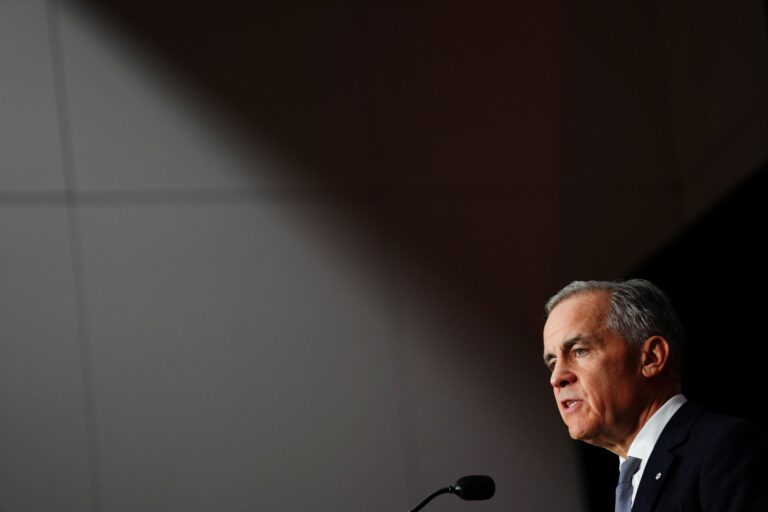Canada’s minister of artificial intelligence recently announced a “30-day national sprint” to help the government renew the country’s AI strategy and secure its oversight of ever-expanding digital technologies.
Evan Solomon gave a committee of 28 AI leaders from various fields the month of October to seek input and also invited the public to share suggestions. This month, committee members are to release the ideas they gathered.
But there are perspectives missing in the current debate over digital technology. Central to Canada’s goals must be a recognition that the United States is becoming an authoritarian country that threatens our economy and autonomy.
An Ipsos poll in September showed that 60 per cent of Canadians surveyed said they could “never trust Americans the same way again.” Despite this public sentiment and Prime Minister Mark Carney’s “elbows up” rhetoric, the government’s actions suggest it does not recognize that our relationship with the U.S. is undeniably, perhaps permanently, fractured. Consider our potential involvement in Trump’s Golden Dome space defence plan. What appears to be underlying much of Ottawa’s discussions on AI strategy is the belief that we have a trade dispute with the U.S. that, once addressed, will result in more normal relations with a trusted ally.
Countering the threat of AI manipulation by authoritarian states
A made-in-Canada approach to AI
Who governs the digital sphere? How U.S. proxy lobbying erodes Canada’s digital sovereignty
The right way for Canada to secure cloud sovereignty
Canada’s health data is flowing abroad while Ottawa stalls on AI rules
Canada relies heavily on U.S. technology companies for our digital communications infrastructure, including services like cloud storage, online commerce, content distribution networks and hardware and software in AI systems. It’s imperative that Canadian policymakers understand that U.S. technology firms like Apple, Google and Meta are beholden to the Trump administration. The president has made it clear these corporations must further his government’s agenda, even when that violates democratic laws or norms.
A Microsoft executive admitted in a Senate hearing in France that American tech companies will fall in line with the U.S. regardless of domestic laws in other countries. This means Canadian digital sovereignty could depend on the whim of a government that has demonstrated its contempt for the courts and could not rely on U.S. companies to uphold our laws.
Yet Ottawa continues to sign agreements with American tech companies and has allowed the U.S. to invest in two Vancouver companies mining critical minerals. Energy Minister Tim Hodgson described the deal as made with an ally and expressed hoped “we can resume the type of relationship that we’ve had with the Americans for a long, long time.” This would suggest the government believes the problem is an irrational U.S. tariff policy rather than a real threat posed by an authoritarian power.
The federal government’s approach appears to have public servants worried as well. Professional services firm KPMG published results in September from a survey of municipal, provincial and federal civil workers on the use of AI. Some 94 per cent of respondents said Canadian data used in large language models like ChatGPT must be stored domestically and 86 per cent worried that public trust would erode if it were stored outside the country. Crucially, 85 per cent believed there is no real understanding of or confidence in how the public service will develop and use AI. It appears government workers are not prepared for the rapid shift to artificial intelligence planned by the Carney government.
Concerns about data sovereignty and public trust are particularly critical given the $240-million deal Canada signed last summer with Toronto-based AI firm Cohere “to enhance operations within the public service.” Cohere is partnering with CoreWeave, a cloud computing firm based in New Jersey, to run a new Canadian data centre in Cambridge, Ont. This allows Cohere to train its large language models here instead of in the U.S., where the company has an office in San Francisco.
It’s unclear how a U.S. cloud provider building a data centre in Canada contributes to our data independence. Some Canadian data centres have criticized the Canadian government’s decision to essentially fund a U.S. firm. As Jim Hinton, an intellectual property expert, said of the deal: “Simply buying compute capacity doesn’t make Canada richer or better at generating, retaining and commercializing AI.”
There are few details on what “enhancing operations” with AI means within the civil service. Instead, the federal budget released Nov. 4 includes plans to cut 40,000 positions, or 10 per cent, over the next several years. The Cohere deal is likely to help do that by replacing people with chatbots and other AI tools. But there are legal implications if AI provides incorrect information to people. Air Canada found that out in 2024, when it was held liable for incorrect ticket information given by a chatbot. There are also privacy and data-security implications. What safeguards will be in place to ensure AI safely and reliably delivers high-quality services?
Will Canadians trust AI tools to deliver public services and potentially make life-changing decisions in areas of immigration, taxation and security? In a Leger poll in August, a majority of respondents (64 per cent) said they might trust AI for simple household tasks. But that trust dropped to 36 per cent for health advice, 32 per cent for financial guidance and 31 per cent for legal help.
Ottawa’s deal with Cohere is the wrong approach at the wrong time. Cohere, as a service provider, has a conflict of interest in identifying where and when AI should be integrated into the public sector. And the rise of an authoritarian United States makes it most important for Canada to have an experienced and skilled public service that is not tied to a for-profit technology firm.
Our public service is especially vital as the U.S. government dismantles many of its research institutions and regulators that Canada has long relied upon. Democracy is dying in the U.S. and Canada must shore up our institutions and democratic governance.
In its haste to push AI into every facet of government, the economy and society, Ottawa is neglecting its central role as a regulator.
Nor does it inspire confidence in its use of “AI” as an umbrella term that captures any number of data-driven technologies, some of which are unobjectionable, while others, like generative AI, present multiple social, economic and environmental issues. Generative AI remains an unproven technology. By design, its outputs can never be trusted.
Scholars like José van Dijck have been sounding the alarm about data bias for over a decade.
The government’s current approach does not allow for full consideration of the complexities and challenges inherent in any AI or digital policy. There is no way a 30-day sprint can deliver sound ideas in the public interest.
“If AI is to serve the public good, Ottawa must step up as a regulator,” Bhagwant Sandhu, a retired director general in the federal public service, recently wrote in the Hill Times. “Anything less is legislative neglect.”
We agree. There is still time for the government to undertake a proper review that considers the full political, economic, social and environmental consequences of digital technologies that are advancing at breakneck speed and shaping our world far beyond what we could have imagined.
We need to get it right. There is no turning back.













